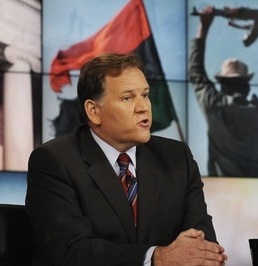Media accused of helping al Qaida
House intel chair skeptical of Putin
Republicans and Democrats appear to have at least one opinion in common: Media coverage of the Snowden documents has helped al Qaida, and there’s now tangible evidence of it.
“We have already seen one al Qaida affiliate completely change the way it does business,” Rep. Mike Rogers (R-Mich.), chairman of the House intelligence committee, told an audience at the Intelligence and National Security Alliance summit in Washington today. He said there is now a “gap” in U.S. ability to react to the group’s activities.
Rogers’ Democratic counterpart on the intelligence committee, C.A. Dutch Ruppersberger, sparked the exchange.
Ruppersberger suggested that the media should police itself in its Snowden coverage to avoid “printing sources and methods that will cause death to Americans.” He added: "the media itself needs to come together and to say how far do we go."
When it was his turn, Rogers joked that Ruppersberger should keep going, and then he picked up the riff: “This has been the most frustrating series of weeks. And candidly, the damage is growing by the day. There’s certain things the newspapers have published that have nothing to do with privacy issues, nothing. They’re providing our adversaries valuable information.”
On Syria, Rogers expanded on past comments that Syria is becoming a battleground for al Qaida. “There’s over 10,000 members who subscribe to al Qaida operating in the eastern part of Syria,” he said. “Where have we ever seen pooling of that larger number of fighters?”
Rogers didn’t answer his question, but he appeared to be referring to Afghanistan before the Sept. 11 terror attacks.
Rogers voiced deep skepticism about Russian President Vladimir Putin’s motives in talks over Syria's chemical weapons. “I hope it works,” he said. “I just don’t think it will work if we don’t have some real credible threat to say, ‘Guess, what: If this negotiation doesn’t go well, we have a whole ‘nother set of options.’”
He scoffed at Putin's op-ed in the Sept. 11 issue of the New York Times, "A Plea for Caution from Russia. "It’s a good lecture by the guy who invaded South Ossetia not that long ago," he said.
Rogers warned that the talks could devolve into a game of stalling: “It takes us four months to decide when to meet. Four months to decide after who gets to meet. Another six months to decide who gets to go into Syria."
And if inspectors do go to Syria's chemical sites, “the Russians want to be the first ones in the door. I imagine there’s some writing in there that might cause them concern,” Rogers said.



